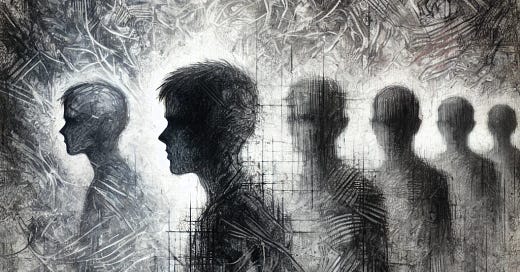The Epistemological Crisis of Gen. Z
Born into the crossfire of a culture war, Generation Z–my generation–finds itself searching for identity in a wasteland of cynicism.
“But, why?”
Perplexed outrage builds in me as I scroll through X/Twitter. I glance from riot video to political pontification, bewildered by the sheer chaos. A quick check of the “Trending” page reveals the soapboxes of the hour. One click, and I can experience the resolute condemnations on both sides of the aisle.
On our screens, the world seems to be on fire–consumed by infernos of hate, treachery, and sometimes sheer ineptitude. Mistrust is high; everyone seems to be looking over their shoulders, checking their backs for knives, and wondering if their next (and last) words will be, “Et tu, Brute?” Headlines, condensing decision-making, leave us wondering, “Now, why on earth did they do that?” As global tensions mount, the future seems bright, but bright with bombs–not sunshine.
Born into the crossfire of a culture war, Generation Z–my generation–finds itself searching for identity in a wasteland of cynicism. Unlike our predecessors, we gather our news almost exclusively from social media, attempting to piece together the polarized information. We are shaped by the posts we read, by the comments we like, by the accounts we follow. Our “For You” pages become our opinions. The problem is these pages weren’t created for a well-rounded understanding of our world. They were curated to keep us hooked.
The general sentiment amongst my peers and myself is the world seems to be on fire. We all agree that whatever is currently happening is not working. Our society is in desperate need of change. This is why you see such diverse, but committed, action in the political sphere. We don’t differ on the passion; we differ on the solution.
I believe the central misunderstanding about Gen. Z is why we are disillusioned. It’s not just teenage moodiness, though that plays a part. Much of our apathy is chalked up to our absorption in social media and the digital realm. However, I think the real reason is deeper than that. The cause of our disillusionment and, I believe, our ideological diversity is the epistemological turmoil we have grown up in. Everywhere we look, the traditional sources of authority have seemingly lost their credibility. We don't know what’s true. Let alone, who to believe.
No clearer example stands than during the pandemic. What started off as an effort at unity during a tragedy quickly became a political war. We soon discovered that misinformation was just as infectious as Covid-19. And, skepticism even more viral. As the scientific information evolved and the recommendations changed, the trust in the guidance of epidemiologists and medical professionals began to falter. Politicians began wielding their skepticism as a symbol of their “freethinking.” They began to pander to the fears of the populous, knowing that anger and anxiety are wonderful poll predictors. The world reeled as the educational, economic, and death tolls kept increasing.
Many began to question their trust in traditional institutions–from religious to scientific to governmental. As more and more institutions became political, trust became more and more shattered based on affiliation. Resigned to demonizing their political foes, many with megaphones seemed more content burning bridges than building them.
Growing up amidst this chaos, we found ourselves trying to create a clear image of truth from the broken shards of polarized information, constantly questioning if our perception of the world was really the truth or a product of our echo chambers. All the while, both sides raged about the “twisted lies” of their counterparts while simultaneously describing their “love for all mankind” in their bios. These paradoxes disintegrated our trust in both.
Addicted to our algorithms, confined to our social media echo chambers, and unmoored from the traditional support structures, many in Gen. Z are unsure of where to turn. We feel as if every side wishes to entice us, just for our votes or money. But, how much do they really care about what they say? According to Gallup, mistrust in political institutions is high with Gen. Zers with Congress and the presidency both scoring a high percentage of “very little” trust (50% and 46% respectively).
However, perhaps this shared skepticism can be the very thing that unites us and provides the foundation to rebuild our communities. The skepticism of Gen. Z reveals a longing for a reality beyond the soundbites and clickbait. The rise of long-form podcasts like the Joe Rogan Experience and the Lex Fridman Podcast where guests sit and discuss a variety of topics for three hours is a fascinating paradox to the era of ten-second TikToks. Both simultaneously exist.
While these long-form shows can spread false information just as well as other forms of media, they allow their audiences to try to understand and connect with someone beyond just their talking points. Their popularity provides a hopeful insight to the future. We are tired of cookie-cutter answers that throw people into binary categories. Though most certainly not perfectly, we are trying to break through the simple, polarized information to reach beyond and reconnect with reality–and each other.




